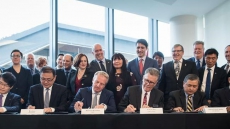OTTAWA — The federal government will not appeal the court decision that tore up cabinet approval for the Trans Mountain pipeline expansion and is appointing former Supreme Court justice Frank Iacobucci to oversee a new round of consultations with Indigenous communities.
Prime Minister Justin Trudeau said his government will follow the "blueprint" laid out by the Federal Court of Appeal in August, which said Ottawa had not properly consulted with Indigenous Peoples because it listened without trying to accommodate concerns.
"If we were to appeal it would take another few years before we could begin construction and we feel the blueprint the court laid out for TMX will allow us to get things done quicker and get our resources to new markets other than the United States in a more rapid fashion," Trudeau said Wednesday.
Natural Resources Minister Amarjeet Sohi said the government does not intend to restart Indigenous consultations from the beginning, but will use them to address the weaknesses the court identified.
He said the government will make "a sincere effort to listen, consult and offer accommodation where those accommodations are possible," but accommodation does not mean Indigenous communities opposed to the project will have authority to halt it.
"We also understand there are still groups that will still oppose this project," Sohi said. "That's fine. That's their right to do so. But that does not mean that if we fulfil our constitutional obligation that those groups may have a veto to stop this project."
The Trans Mountain expansion would triple capacity of the existing pipeline between Edmonton and Burnaby, B.C.
Some Indigenous communities on the coast of British Columbia are adamantly opposed to new energy projects that affect their traditional territory, with concerns about higher risk of oil spills, limited knowledge of how the diluted bitumen the pipeline will carry behaves when spilled in water and further stress for the Southern resident killer whales from more oil tankers in the Salish Sea.
The court decision also said the federal project approval was invalid because the National Energy Board failed to properly assess and take into account the environmental impact of having 35 tankers a month in the sea, up from about five now. The risks to orcas were a particular concern.
Last month, Sohi ordered the board to redo an environmental review of the project's risk of oil spills and the effect on marine life due to increased tanker traffic. The board has until the end of February to report.
Iacobucci's first task will be to work with the federal government, First Nations and Metis leaders to design the new consultation on Indigenous issues. Then he will oversee the process to ensure each step is in keeping with the court's ruling.
The new round will involve consultations with 117 Indigenous communities affected by the project. The government is allotting twice the resources of the last consultation, but Sohi's office could not say Wednesday what the budget would be or how many people would be assisting Iacobucci.
Sohi said he there is no deadline for the process because that could hinder truly meaningful consultation.
Iacobucci served on the Supreme Court from 1991 until his retirement in 2004. He recently served as Ontario's chief negotiator with the Chiefs of the Matawa Tribal Council on the Ring of Fire, a proposed mining and smelting project in Northern Ontario. He resigned from that role when the Doug Ford government was elected in Ontario.
Prior to that he spent two years consulting for the provincial government on how to get more Indigenous people on juries in Ontario.




